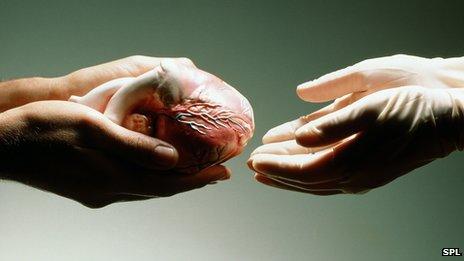Organ donation plea from heart transplant girl
- Published

NHS Blood and Transplant says there is a huge demand for organs
Nearly four years ago Sophie Gilman, from Sevenoaks, was in bad way.
She could only attend school two or three times a week, for half a day, and she spent most of her time lying around the house.
"I got very breathless and I was on tablets a lot. Life wasn't great," she says.
She was diagnosed with dilated cardiomyopathy and told she would need a heart transplant by the time she was 21.
In the end she was just 15 when she was given the life-saving operation at Great Ormond Street Hospital (GOSH) in London.
"I got worse much more quickly than the doctors thought I would, but I only waited six days for a new heart and I was out of hospital within 17 days."
It sounds a simple solution, but there is nothing simple about replacing a child's diseased heart with another healthy one and nothing easy about the decision to donate an organ so that someone else's child might live.
Sophie admits that she thinks about it quite a lot.
"It doesn't feel real sometimes, having someone else's heart in my body, but it just feels like mine now.
"I'm really glad I have it and I feel incredibly lucky."
Dr Matthew Fenton, consultant paediatric cardiologist and heart transplant doctor at GOSH, says it's worth remembering that organ donation is a precious gift.
"I want to recognise the generosity and thoughtfulness of all the people and families who have donated organs over the years and made these transplants possible.
"At such an incredibly difficult time for their own family, organ donation can be a tough decision to make - but it's also an extremely powerful one in granting a child a second chance at life."
Dr Fenton, who looks after the families before and after transplant surgery takes place, says children are not just restricted to accepting a heart from another child.
Larger adults hearts can be transplanted into quite young children, he explains.
"A heart from a 60kg adult can be matched with a six-year-old who weighs just 20kg.
"That's why we need more adults donating because their organs can be used in children, and that means the smaller hearts which become available can be used for much younger children."
Transplant operations of this kind have very good outcomes. The mortality rate is less than 10%, and one year after surgery, there is a 92% survival rate.
The life expectancy of a child who has had a heart transplant is only around 20 years however - unless they are lucky enough get another donor heart.
Change of consent
NHS Blood and Transplant is the body responsible for encouraging people to donate organs, blood and tissues.
It says there is a huge demand for organs which outstrips supply. Their figures show that more than 10,000 people in the UK are currently waiting for a transplant and of these, 1,000 each year will die because there are not enough organs available.
But this week Wales decided to change the way organ donation works, by creating a new system of presumed consent.
Instead of joining a register if you want to donate organs, as in Northern Ireland, England and Scotland, people in Wales will consent to their organs being donated unless they opt out.
With only 31% of people in Britain having joined the Organ Donor Register, external up until now, the change of approach in Wales is bound to boost organ donations.
But with the help of new technology, there may come a time when there will be no need for organ transplants at all.
A team at GOSH is investigating how using a patient's own stem cells might help the heart repair itself while a donor organ is being found, and they hope this technique may help to repair damaged hearts completely in the future.
Heart to heart
Twenty-five years ago, the first heart transplant was carried out at Great Ormond Street Hospital, by surgeon Prof Marc de Leval. Five hundred transplants involving hearts and lungs have since taken place at the hospital and advances in medicine and technology have helped to keep more children alive.
One of the greatest developments has been the use of the Berlin Heart, a machine which takes over from the heart and helps to pump blood around the child's body.
This allows the child to move around without being confined to a bed and keeps children alive while they wait for a donor heart to become available.
Dr Mike Burch, paediatric cardiologist and director of cardiothoracic transplantation at GOSH, says the Berlin Heart could also potentially enhance children's quality of life for a significant number of years before the need for a transplant returns.
For Sophie, life has transformed since her heart transplant.
She is full of energy once again, she completed her A-levels last year and has just started a new job in London - and she has a message for people who are thinking about registering to be a donor.
"If you're willing to take an organ then you should be willing to donate one. Why not do the same back?" she says.
- Published2 July 2013
- Published1 July 2013